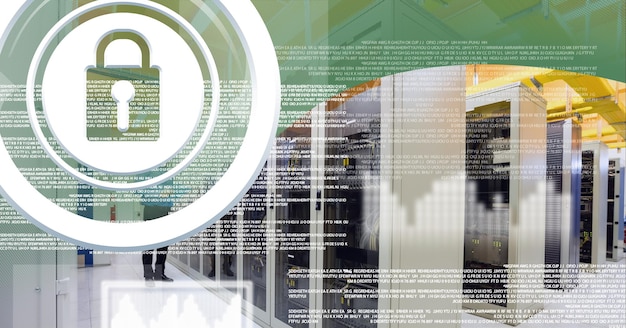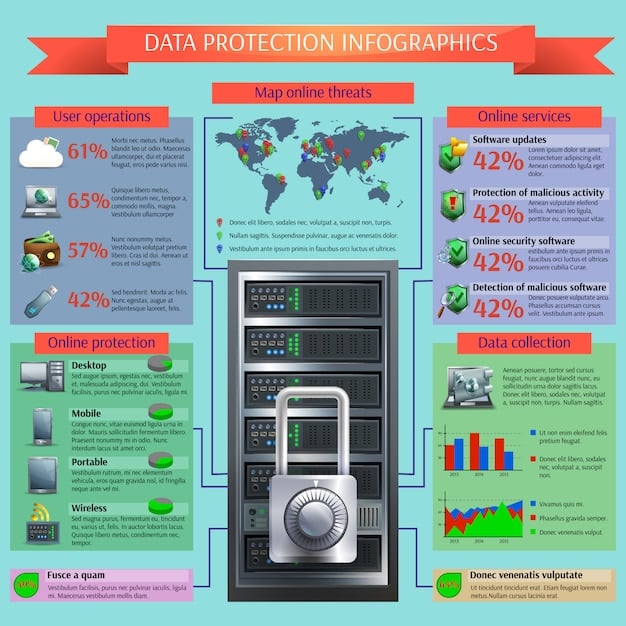VPN vs. Proxy: Which Offers Better Cybersecurity Protection in the US?

VPNs and proxies both offer ways to enhance online security and privacy in the US, but VPNs provide a more comprehensive solution by encrypting all internet traffic, while proxies typically only cover traffic from a specific application.
Navigating the world of online security can feel like traversing a minefield, especially with increasing cyber threats targeting internet users in the US. When it comes to enhancing your digital privacy, two common tools often come up: VPN vs. proxy: Which offers better cybersecurity protection in the US? Exploring their differences is key.
Understanding VPNs and Their Cybersecurity Benefits
A Virtual Private Network, or VPN, creates a secure, encrypted connection over a less secure network. When you use a VPN, your internet traffic is routed through an encrypted tunnel, protecting your data from being intercepted by cybercriminals, government agencies, or even your internet service provider (ISP).
How VPNs Work
VPNs encrypt your internet traffic and mask your IP address, making it difficult to trace your online activities back to you. This encryption protects your sensitive information, such as passwords, financial details, and personal communications, especially when using public Wi-Fi networks.
Key Benefits of Using a VPN
VPNs offer several cybersecurity advantages, here are a few key benefits:
- Encryption: VPNs encrypt your entire internet connection, securing all data transmitted between your device and the VPN server.
- IP Address Masking: By masking your IP address, VPNs help maintain your anonymity online.
- Bypassing Geo-Restrictions: VPNs allow you to access content that may be restricted in your geographical location.
In essence, a VPN provides a comprehensive approach to online security, acting as a shield for all your internet activities. This makes it particularly useful for individuals concerned about data privacy and security in the US.

Exploring Proxies and Their Role in Cybersecurity
A proxy server acts as an intermediary between your device and the internet. When you use a proxy, your internet traffic is routed through the proxy server, which then forwards your request to the website or online service you are trying to access. This can provide a degree of anonymity, but proxies don’t offer the same level of security as VPNs.
Types of Proxies
There are several types of proxies, each with its own characteristics and levels of security:
- HTTP Proxies: These are the most common type and are primarily used for web browsing.
- SOCKS Proxies: SOCKS proxies can handle any type of internet traffic, making them more versatile than HTTP proxies.
- Transparent Proxies: These proxies don’t hide your IP address and are often used in corporate or public networks for content filtering or caching.
Limitations of Proxies in Cybersecurity
While proxies can offer some benefits, they also have significant limitations when it comes to cybersecurity:
- Limited Encryption: Most proxies don’t encrypt your internet traffic, leaving your data vulnerable to interception.
- Application-Specific: Proxies typically only protect traffic from a specific application, not your entire internet connection.
- Trust Issues: Using a free or unreliable proxy server can expose you to security risks, such as malware or data logging.
Proxies primarily focus on changing your IP address, which allows you to bypass geo-restrictions or access content anonymously. However, the lack of encryption means that your data can be vulnerable to cyber threats.
VPN vs. Proxy: A Detailed Comparison of Security Features
When choosing between a VPN and a proxy, it’s essential to understand their core differences in terms of security features. While both can mask your IP address, they differ significantly in how they protect your data.
Encryption Capabilities
The most significant difference between VPNs and proxies lies in their encryption capabilities:
- VPNs: VPNs encrypt all internet traffic passing through their servers, providing end-to-end protection.
- Proxies: Most proxies don’t encrypt your data, making it vulnerable to eavesdropping.
Scope of Protection
Another crucial consideration is the scope of protection offered by each tool:
- VPNs: VPNs protect all internet traffic from your device, regardless of the application or protocol used.
- Proxies: Proxies typically only protect traffic from a specific application, such as a web browser.
Performance and Speed
The impact on internet speed is another factor to consider:
- VPNs: Encryption can introduce some overhead, potentially slowing down your internet speed. However, premium VPN services minimize this impact.
- Proxies: Proxies may also slow down your internet speed, especially if the proxy server is overloaded or located far away.
In summary, while both VPNs and proxies can provide some level of anonymity, VPNs offer a more comprehensive and secure solution due to their robust encryption and broader scope of protection.

Assessing Your Specific Cybersecurity Needs in the US
Choosing between a VPN and a proxy depends on your specific cybersecurity needs. Understanding your priorities and risk tolerance is crucial in making the right decision.
Identifying Your Security Risks
Consider the types of online activities you engage in and the potential risks involved:
- Sensitive Communication: If you handle sensitive information, such as financial transactions or confidential emails, a VPN is essential.
- Public Wi-Fi Usage: When using public Wi-Fi networks, a VPN can protect your data from being intercepted by hackers.
- Geo-Restricted Content: If you want to access content that is restricted in the US, both VPNs and proxies can help.
Determining Your Privacy Goals
Your privacy goals also play a significant role in your decision:
- Anonymity: If your primary goal is to hide your IP address, a proxy may suffice.
- Data Protection: If you want to protect your data from government surveillance or cybercriminals, a VPN is the better choice.
Balancing Cost and Security
Cost is another factor to consider, VPNs often come with more features, but also can come with an extra cost.
- Free Proxies: Free proxies often come with risks, such as malware or data logging.
- Paid VPNs: Paid VPN services offer better security and performance but come at a cost.
Think about what you’re looking for with privacy protection. If you value strong security and comprehensive protection, a premium VPN is the optimal choice. For basic IP masking, a reliable proxy may be sufficient.
Making the Right Choice: Practical Scenarios and Recommendations
To illustrate the differences between VPNs and proxies, let’s consider a few practical scenarios and recommendations for users in the US.
Scenario 1: Securing Online Banking
When conducting online banking or accessing financial accounts, security is paramount. In this scenario, a VPN is highly recommended. A VPN’s encryption ensures that your financial data is protected from interception, especially when using public Wi-Fi.
Scenario 2: Accessing Geo-Restricted Streaming Content
If your primary goal is to access streaming content that is not available in the US, a proxy might suffice. However, keep in mind that proxies don’t encrypt your data and may not provide the best performance for streaming.
Scenario 3: Protecting Sensitive Communications
For individuals who handle sensitive communications, such as journalists or activists, a VPN is essential. A VPN’s encryption ensures that your communications remain private and secure, protecting you from surveillance.
General Recommendations
Generally, here are some overarching recommendations :
- Prioritize VPNs for Security: Choose a VPN when security and data protection are your top priorities.
- Consider Proxies for Basic Anonymity: Use a proxy for basic IP masking and bypassing geo-restrictions.
- Always Choose Reliable Providers: Whether you opt for a VPN or a proxy, choose a reputable provider with a proven track record.
By considering these scenarios and recommendations, you can make an informed decision about whether a VPN or a proxy is the right choice for your cybersecurity needs in the US.
| Key Aspect | Brief Description |
|---|---|
| 🔒 Encryption | VPNs offer full encryption; proxies often lack it. |
| 🌐 Scope of Protection | VPNs protect all traffic; proxies are app-specific. |
| 📍 IP Masking | Both hide your IP, but VPNs offer better overall privacy. |
| 🛡️ Security | VPNs provide stronger security against cyber threats. |
Frequently Asked Questions
The main difference is that a VPN encrypts all your internet traffic, providing comprehensive security, while a proxy typically only masks your IP address and doesn’t encrypt your data.
Yes, for cybersecurity, a VPN is generally better because it encrypts all traffic, providing a secure tunnel for your data, unlike proxies which offer limited security.
Yes, you can use a VPN and a proxy together, but it’s not usually necessary. A VPN provides robust encryption, making a proxy redundant for most users seeking enhanced security.
Free VPNs may compromise your data by logging activities or displaying intrusive ads. Paid VPN services are generally safer and offer better performance and security features.
A VPN might slightly slow down your internet speed due to the encryption process. However, premium VPN services minimize this impact with optimized servers and protocols.
Conclusion
In the debate of VPN vs. proxy for cybersecurity protection in the US, VPNs offer a more robust and comprehensive solution for protecting your online activities. While proxies can provide a basic level of anonymity, they lack the encryption and broad scope of protection offered by VPNs, making VPNs the preferred choice for those serious about their digital security.





